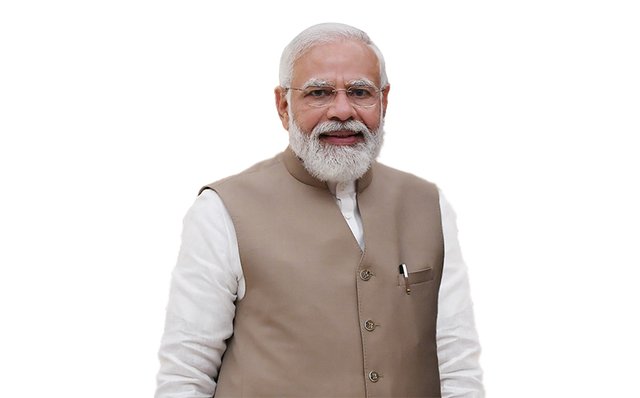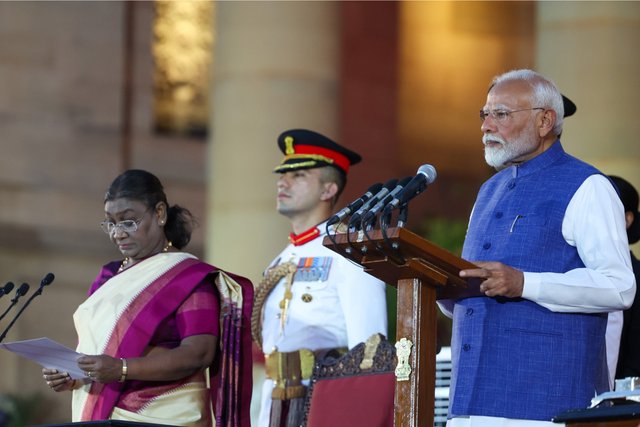PM from India


PM IndiaShri Narendra Modi was sworn-in as India’s Prime Minister for the third time on 9th June 2024, following another decisive victory in the 2024 Parliamentary elections. This victory marked the third consecutive term for Shri Modi, further solidifying his leadership.
The 2024 elections saw a remarkable voter turnout, with a significant portion of the electorate showing continued confidence in Shri Modi’s leadership and vision for the country. His campaign focused on a blend of economic development, national security, and social welfare programs, which resonated widely with the populace.
Shri Modi’s third term is expected to build on the foundations laid during his previous tenures, with a renewed emphasis on technological innovation, infrastructure development, and international diplomacy, further positioning India as a global powerhouse. The unprecedented third term underscores Shri Modi’s enduring appeal and the trust placed in him by millions of Indians to lead the nation towards greater prosperity and stability.
The first ever Prime Minister to be born after Independence, Shri Modi has previously served as the Prime Minister of India from 2014 to 2019, and from 2019 to 2024. He also has the distinction of being the longest serving Chief Minister of Gujarat with his term spanning from October 2001 to May 2014.
In the 2014 and 2019 Parliamentary elections, Shri Modi led the Bharatiya Janata Party to record wins, securing absolute majority on both occasions. The last time that a political party secured such an absolute majority was in the elections of 1984.
Inspired by the motto of ‘SabkaSaath, Sabka Vikas, Sabka Vishwas’, Shri Modi has ushered in a paradigm shift in governance that has led to inclusive, development-oriented and corruption-free governance. The Prime Minister has worked with speed and scale to realise the aim of Antyodaya, or ensuring last-mile delivery of schemes and services.
Leading international agencies have noted that under the leadership of PM Narendra Modi, India has been eliminating poverty at record pace. According to the findings from NITI Aayog’s latest report ‘Multidimensional Poverty in India since 2005-06’, almost 25 crore people escaped multidimensional poverty in last nine years. The credit for this remarkable achievement goes to significant initiatives of the government to address all dimensions of poverty.
Today, India is home to the world’s largest healthcare programme, Ayushman Bharat. Covering over 50 crore Indians, Ayushman Bharat provides top quality and affordable healthcare to the poor and neo-middle class.
The Lancet, considered among the most prestigious health journals in the world has lauded Ayushman Bharat, stating that this scheme attends to the larger discontent about the health sector in India. The journal also noted PM Modi’s efforts to prioritise universal health coverage.
Understanding that financial exclusion was a bane for the poor, the Prime Minister launched the Pradhan Mantri Jan Dhan Yojana, that aimed at opening bank accounts for every Indian. Now, over 51 crore Jan Dhan accounts have been opened. These accounts have not only banked the unbanked but also opened the doors for other avenues of empowerment.
Going a step ahead of Jan Dhan, Shri Modi emphasised on Jan Suraksha, by giving insurance and pension cover to the most vulnerable sections of society. The JAM trinity (Jan Dhan- Aadhaar- Mobile) has led to elimination of middle men and ensured transparency and speed, powered by technology.
The Pradhan Mantri Ujjwala Yojana, launched in 2016 provides free cooking gas connections to the poor. It has proven to be a major game-changer in providing smoke-free kitchens to over 10 crore beneficiaries, most of whom are women.
18,000 villages that were without electricity even after 70 long years of Independence have been electrified.
Shri Modi believes that no Indian should be homeless and to realise this vision, over 4.2 crore houses were sanctionedunder the PM Awas Yojana between 2014 and 2024. In June 2024, after assuming office for the third term, one of the first decisions of the Cabinet was to assist 3 crore additional rural and urban households for the construction of houses, underscoring Shri Narendra Modi’s commitment to addressing the nation’s housing needs and ensuring dignity and a quality life for every citizen.
Agriculture is a sector that is very close to Shri Narendra Modi. During the interim budget of 2019, the Government announced a monetary incentive for farmers called the PM Kisan Samman Nidhi. In almost three weeks, on 24th February 2019, the scheme was launched and instalments have been paid regularly since then. During the first Cabinet Meeting of PM Modi’s second term, it was decided to extend the PM Kisan benefits to all farmers, removing the 5 acre limit that was present earlier. As of June 2024, Shri Modi released the 17thinstalment of the PM-KISAN scheme at Varanasi in which more than 9.2 crore farmers received the benefits amounting to over Rs.20,000 crore.
Shri Modi has also focused path-breaking initiatives for agriculture ranging from Soil Health Cards, E-NAM for better markets and a renewed focus on irrigation. On 30th May 2019, PM Modi fulfilled a major promise by creating a new Jal Shakti Ministry to cater to all aspects relating to water resources.
On 2nd October 2014, Mahatma Gandhi’s Birth Anniversary, the PM launched ‘Swachh Bharat Mission’ a mass movement for cleanliness across the nation. The scale and impact of the movement is historic. Today, sanitation coverage has risen from 38% in 2014 to 100% in 2019. All states and Union Territories have been declared open defecation free (ODF). Substantive measures been taken for a clean Ganga.
The World Health Organisation has appreciated the Swachh Bharat Mission and has opined that it would save three lakh lives.
Shri Modi believes that transportation is an important means towards transformation. That is why, the Government of India has been working to create next-generation infrastructure be it in terms of more highways, railways, i-ways and waterways. The UDAN (UdeDesh Ka Aam Nagrik) Scheme has made aviation sector more people-friendly and boosted connectivity.
PM Modi launched the ‘Make in India’ initiative to turn India into an international manufacturing powerhouse. This effort has led to transformative results. India has made significant strides in ‘Ease of Doing Business’, improving its ranking from 142 in 2014 to 63 in 2019. The Government of India rolled out the GST during a historic session of Parliament in 2017, which has realised the dream of ‘One Nation, One Tax.’
During his tenure, special attention has been paid to India’s rich history and culture. India is home to the world’s largest statue, the State of Unity, a fitting tribute to Sardar Patel. This Statue was built through a special mass movement where tools of farmers and soil from all states and Union Territories of India were used, signifying the spirit of ‘Ek Bharat, Shreshtha Bharat.’
PM Modi is deeply passionate about environmental causes. He has time and again called for closing of ranks to create a clean and green planet. As Chief Minister of Gujarat, Shri Modi created a separate Climate Change Department to create innovative solutions to climate change. This spirit was seen in the 2015 COP21 Summit in Paris where PM Modi played a key role in the high-level deliberations.
Going a step ahead of climate change, PM Modi has talked about climate justice. In 2018, Heads of State and Government from several nations came to India for the launch of the International Solar Alliance, an innovative effort to harness solar energy for a better planet.